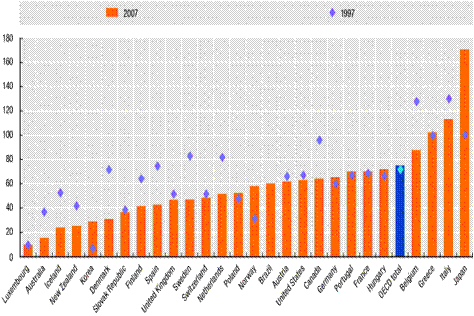If only the state of a "permanent revolution" here in the US would
calm down just a tad .... because, there is a global opportunity that we can tap into: the Euro is heading into a big fall and, yet again, the dollar and the US will be viewed as one hell of a safe investment amidst the chaos of the world. First, from the
WSJ:
The euro is likely to face further declines this week as concern over sovereign debt in Europe prompts investors to seek refuge in the perceived safety of the dollar and the yen.
Pressure on the common currency escalated last week, as worries about the soundness of debt issued by Greece spread to other fiscally stressed euro-zone nations, including Portugal and Spain.
Second, a little more on the sovereign debt, from
The Economist:
As you can clearly see at right, Europe's deficit troubles began well before the global economic collapse.Now, there was an interesting discussion in the Washington office this week over whether it was possible for there to be a simultaneous crisis for all sovereign debt. While perhaps technically possible, it does seem unlikely, and so one might argue that countries with a relatively sound fiscal position, like America, have a lot of room to borrow for now, because debt worries elsewhere are causing investors to look for relatively safe havens.
Ok, back to the WSJ:
The euro's losses were about 1.5% against the dollar last week, bringing its year-to-date slide to 4.6%. Against the yen, the common currency dropped Friday to a near 12-month low.
"Until we see signs of acceptance by those [nations] that austerity measures need to be put in place to resolve the fiscal imbalances, the euro will continue to deteriorate," said Thanos Papasavvas, head of currency management at Investec Asset Management in London, which oversees about $60 billion.
Ballooning budget deficits in euro-zone countries threaten to hurt an economic recovery, forcing the ECB to keep interest rates low longer than anticipated, in contrast to expectations of quicker increases from the U.S. Federal Reserve.
So, can the G7 do anything? What says you,
Professor Simon Johnson?
Ex-IMF chief economist Simon Johnson, also described the G7 group of leading economies as "fundamentally useless".
Johnson does not hold anything back:
Greece is an an extreme example - there I think you can see that it's going to get very messy very quickly - but unfortunately the budget situation in these other countries is also weak.
"And I have to add the UK to this list. Unless you can persuade the markets that you're really going to bring the budget under control within the foreseeable future and you're going to have some credible actions - and you're going to have to do some persuading - you're going to have big trouble."
But,
Paul Krugman has a different take and, get this, it has an abbreviation that "sounds" great when you say it aloud as a word: PIIGS :) .... Krugman writes:
As Europe is roiled by sovereign debt fears, it’s important to realize that the crisis in the largest of the PIIGS (Portugal, Ireland, Italy, Greece, Spain) has nothing to do with fiscal irresponsibility. ....
The point is that this has nothing to do with a spendthrift government; what’s happening to Spain reflects the inherent problems with the euro, which now more than ever looks like a monetary union too far.
Krugman then has this update:
Update: Whoops. Yes, Italy is bigger than Spain — and it has been fiscally irresponsible. But in a way that makes the point; Spain, which has been a good actor, is in much more trouble than Italy, which hasn’t
All the economists of the world will duke this out. As far as I am concerned, once again the US dollar becomes a safe haven--despite the humongous mess that we are in. How bizarre, eh!


No comments:
Post a Comment